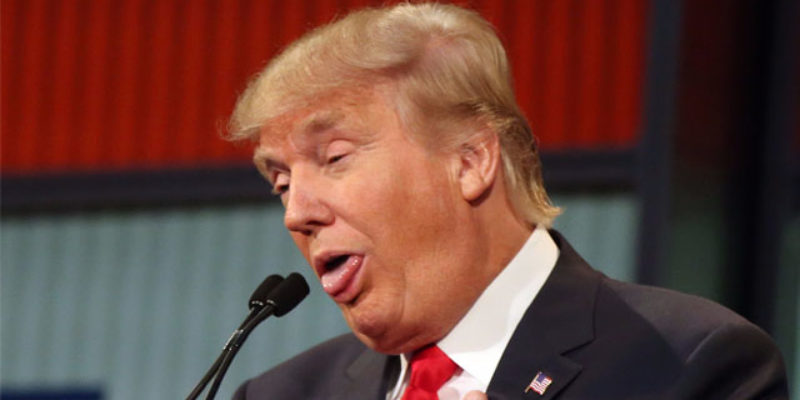You might have heard about this already, but now you’ll get to see it. It’s from the CNN Town Hall last night.
Asked what the top three functions of the federal government are, he named “security, security and security” as the three, and then he proceeded to add education and health care and “providing good neighborhoods” to the mix.
And CNN moderator Anderson Cooper actually stepped in and saved Trump by suggesting to him that those functions outside of national security are not considered federal functions at all, which resulted in his crawfishing and saying that he hates Common Core and that while the federal government might “lead it” in providing health care it needs to be done in the private sector.
Trump has been running for president for the better part of a year and he’s been talking about these issues the entire time, and he doesn’t have any better answer than this? Education and health care as federal responsibilities? Is he Bernie Sanders with a 600-ship navy, or what?
How should this question be answered? Well, if you’re familiar with the Constitution and know what’s in Article I, Section 8, you have a decent list of functions it specifically authorizes the federal government to perform. An actual conservative who is qualified to take the oath of office to uphold and defend the Constitution could pick three from these and do just fine. Unfortunately, it doesn’t discuss education and health care…
SECTION 8
The Congress shall have Power To lay and collect Taxes, Duties, Imposts and Excises, to pay the Debts and provide for the common Defence and general Welfare of the United States; but all Duties, Imposts and Excises shall be uniform throughout the United States;
To borrow Money on the credit of the United States;
To regulate Commerce with foreign Nations, and among the several States, and with the Indian Tribes;
To establish an uniform Rule of Naturalization, and uniform Laws on the subject of Bankruptcies throughout the United States;
To coin Money, regulate the Value thereof, and of foreign Coin, and fix the Standard of Weights and Measures;
To provide for the Punishment of counterfeiting the Securities and current Coin of the United States;
To establish Post Offices and post Roads;
To promote the Progress of Science and useful Arts, by securing for limited Times to Authors and Inventors the exclusive Right to their respective Writings and Discoveries;
To constitute Tribunals inferior to the supreme Court;
To define and punish Piracies and Felonies committed on the high Seas, and Offences against the Law of Nations;
To declare War, grant Letters of Marque and Reprisal, and make Rules concerning Captures on Land and Water;
To raise and support Armies, but no Appropriation of Money to that Use shall be for a longer Term than two Years;
To provide and maintain a Navy;
To make Rules for the Government and Regulation of the land and naval Forces;
To provide for calling forth the Militia to execute the Laws of the Union, suppress Insurrections and repel Invasions;
To provide for organizing, arming, and disciplining, the Militia, and for governing such Part of them as may be employed in the Service of the United States, reserving to the States respectively, the Appointment of the Officers, and the Authority of training the Militia according to the discipline prescribed by Congress;
To exercise exclusive Legislation in all Cases whatsoever, over such District (not exceeding ten Miles square) as may, by Cession of particular States, and the Acceptance of Congress, become the Seat of the Government of the United States, and to exercise like Authority over all Places purchased by the Consent of the Legislature of the State in which the Same shall be, for the Erection of Forts, Magazines, Arsenals, dock-Yards, and other needful Buildings;-And
To make all Laws which shall be necessary and proper for carrying into Execution the foregoing Powers, and all other Powers vested by this Constitution in the Government of the United States, or in any Department or Officer thereof.
Rather than quote these directly, it might be acceptable to say that a federal function would be to promote economic growth through sound fiscal, economic and tax policy. Or to provide a judicial system to address crime and civil cases beyond what states can provide.
There are lots of ways to answer the question without giving yourself away as a big-government progressive. Trump couldn’t.
Some of you support this. It’s getting harder to defend that, but you seem persistent about it. Fine. Don’t ask us to, because the answer is no.
Advertisement
Advertisement

